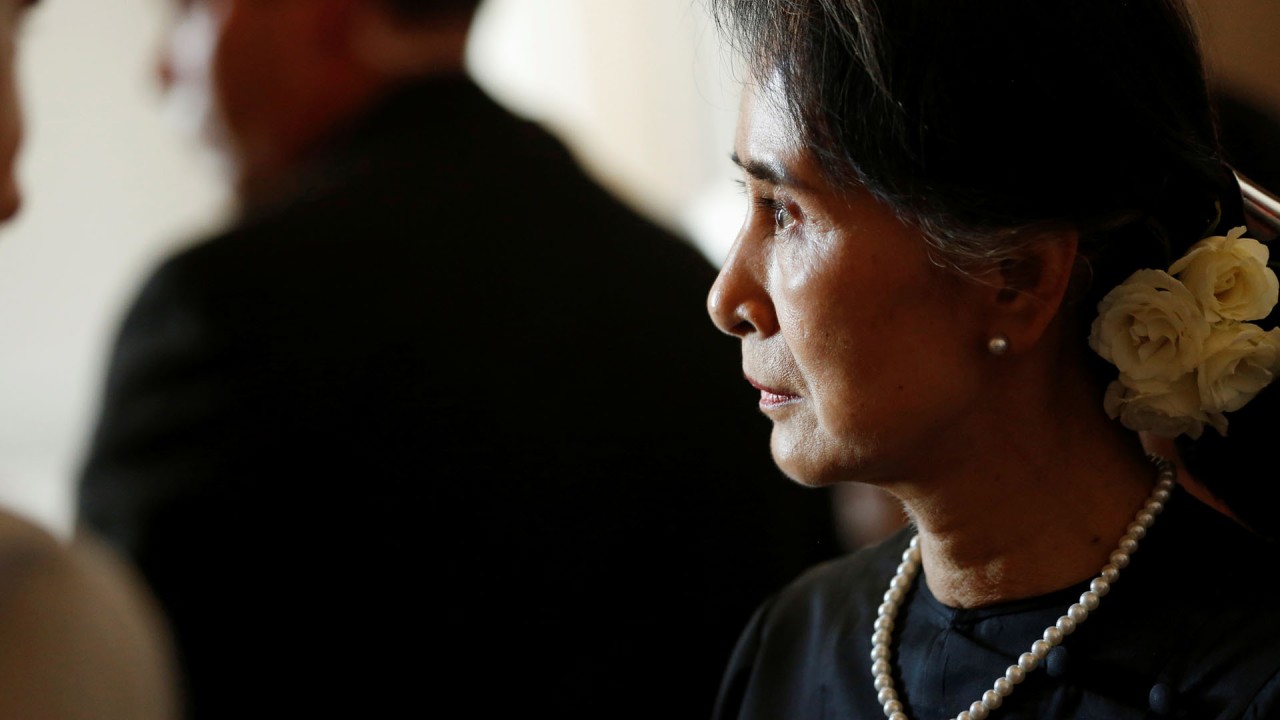
Myanmar’s ousted leader Aung San Suu Kyi’s sentence reduced from four years to two years after ‘partial pardon’
- The 76-year-old was found guilty of incitement against the military and breaching Covid-19 rules during elections last year
- Former president Win Myint was also handed a 4-year jail term, but both leaders will serve half their sentence after a ‘partial pardon’ from the junta chief
She will serve a reduced two-year sentence in the undisclosed place where she is currently detained – instead of a prison – following a “partial pardon” granted by junta chief Min Aung Hlaing, state television said in a late night bulletin.
In an immediate response, the United Nations High Commissioner for Human Rights, Michelle Bachelet, said the verdict following a “sham trial” was “not only about arbitrary denial of [Suu Kyi’s] freedom [but] also closes yet another door to political dialogue”.
Monday’s verdict was linked to charges over incitement against the military and for breaching Covid-19 rules during elections last year. Alongside Suu Kyi, her key aide who held the position of president, Win Myint, was also sentenced to a four-year jail term.
The state media statement said Win Myint’s sentence would also be reduced to a two-year term in detention.
International rights monitors say the various charges Suu Kyi and her confidantes are facing – including corruption, electoral fraud and illegally possessing walkie talkies – are trumped up by the military to end her political career. If convicted of the 11 charges she faces, Suu Kyi could spent the rest of her life in jail.
The NLD staged a decisive victory in polls last November, incensing the military which had hoped its political proxies would win the vote in the country’s second general election after the unwinding of a previous period of junta rule.
Suu Kyi spent most of the 1990s and 2000s under house arrest after the then ruling military junta refused to recognise the landslide victory of the NLD in a 1990 general election.
Tortured, executed, shot: a junta’s way of death in post-coup Myanmar
Ties between Suu Kyi and the military thawed in the transition to civilian rule since 2011, but she was still barred from becoming president after the NLD won 2015’s election.
She assumed the position of state counsellor, and her leadership of the NLD makes her the country’s de facto leader. Key aides Htin Kyaw and subsequently Win Myint held the position of president between 2015 and the party’s ouster in February.
Major international rights groups condemned Monday’s ruling. Bachelet, the UN human rights commissioner said the junta was using the courts to neutralise its opponents.
“But these cases cannot provide a legal veneer to the illegitimacy of the coup and military rule,” she said.
“No one is fooled by today’s sentencing. Since the day of the coup, it’s been clear that the charges against Aung San Suu Kyi, and the dozens of other detained MPs, have been nothing more than an excuse by the junta to justify their illegal power grab,” said Charles Santiago, the chair of the Asean Parliamentarians for Human Rights group.
“This ridiculous ruling is a travesty of justice, it only demonstrates the junta’s continuing contempt for Asean and the Five-Point Consensus, on which it has reneged,” said Santiago, a Malaysian lawmaker.
That move was taken after the junta chief’s repeated prevarication on implementing the bloc’s post-coup peace road map – the five-point consensus. The plan, which Min Aung Hlaing initially agreed to, requires the junta to allow Asean representatives to enter Myanmar to hold talks with all concerned parties including Suu Kyi.
The junta has said this is untenable as Suu Kyi was facing criminal cases.
Myanmar junta blames ‘foreign intervention’ for Asean summit exclusion
China has said it supports all parties reaching a political settlement through dialogue under existing constitutional and legal frameworks. Critics, however, point to Beijing’s close ties with Myanmar’s military as an obstacle.
“On one hand it is the military that has firmly enjoyed great power under Myanmar’s constitution, and on the other hand it is the NLD and Aung San Suu Kyi that have the greatest popular support,” Fan said, “China is in a dilemma in dealing with both sides, and it is not in China’s interest to take a stand against one side or the other.”
Santiago said Monday’s ruling was “further evidence that Asean should hold the line against this illegal takeover”.
He said: “We continue to call for Asean to ban all junta representatives from its meetings, prevent junta generals from travelling in the region, and to engage with the duly-elected National Unity Government (NUG)”.
That remark appeared to be aimed at Cambodian President Hun Sen, who assumes the position of Asean chair in 2022. The strongman has signalled he is open to softening his position on Myanmar and is expected to visit the country on Tuesday.

“It’s a family member of Asean, they must have the rights to attend meetings,” he was quoted as saying earlier on Monday.
The NUG, comprising NLD figures in hiding or exile as well as some of the country’s various ethnic armed organisations, has said it is waging a “defensive war” to combat the military’s post-coup atrocities.
More than 1,200 people have been killed and over 10,000 detained since Min Aung Hlaing seized power 10 months ago.
Junta officials have in recent weeks sought to suggest normalcy is returning to the country, with information minister Maung Maung Ohn telling This Week in Asia in a November interview that a broad reopening of international travel – restricted since the start of the Covid-19 pandemic – could take place by March.
The minister suggested peace and order was returning to the country after months of chaos.
In reality, however, the fighting has continued. On Sunday, a military truck rammed into protesters in Yangon, and soldiers opened fire on a small crowd. Five people were killed in the incident, according to local media.
Additional reporting by Laura Zhou




